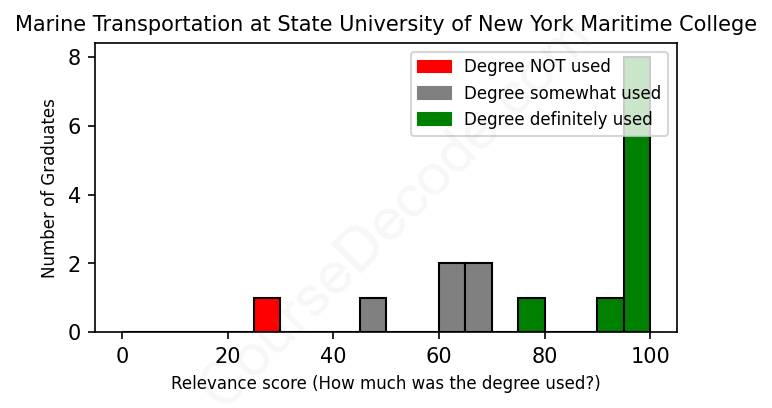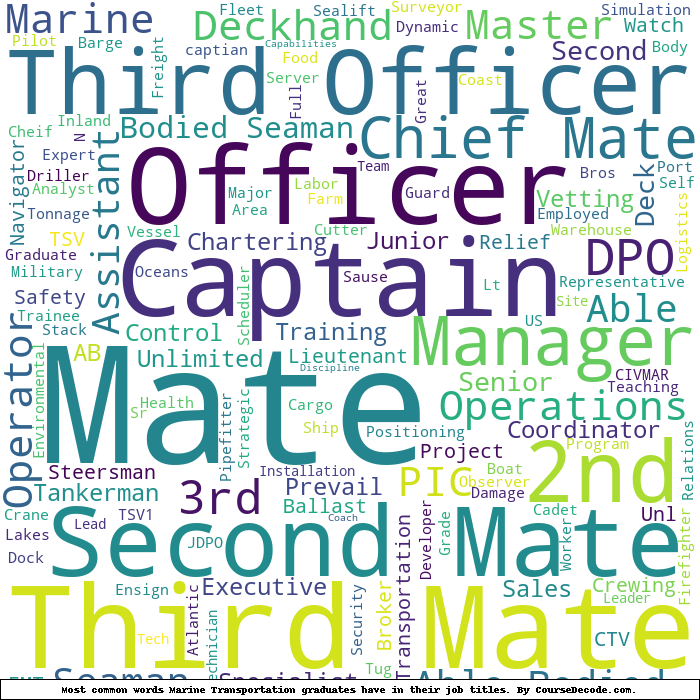
First, some facts. Of the Marine Transportation graduates from State University of New York Maritime College we've analyzed , here's how many have used (or NOT used) their degree in their career:

These are estimates based on AI analysis of 16 LinkedIn profiles (see below).
The verdict? Significantly above average. Overall, with an average relevance score of 80%, Marine Transportation graduates from State University of New York Maritime College have a much higher likelihood (+13%) of finding work in this field compared to the average graduate across all fields:
And for comparison, here's the chart for all profiles we've looked at across all degrees.
Also, after graduating, only 12% of these graduates have pursued further education other than another Bachelor's degree (such as a Masters degree or other), compared to the average across all profiles of 35%. This suggests a Bachelors degree is enough for most Marine Transportation graduates, and it's normal to look for work straight after graduation.
See the details:
|
Relevance score: 100% We think this person has gone into a career highly relevant to their degree. We think this person has gone into a career highly relevant to their degree.
DEGREE INFOGraduated in 2015 from State University of New York Maritime College with a Bachelor's Degree in Marine Transportation. No other secondary education since. JOB HISTORY SINCE GRADUATIONSecond Mate Oceans Military Sealift Command Sep 2015 - Sep 2021 DPO Ship Officer  Edison Chouest Offshore Sep 2021 - Present ABOUTNo information provided. |
The top 10 most common jobs done by the graduates we've analyzed (ranked most common to least) are:
When you look at the job history of graduates from the Marine Transportation program at State University of New York Maritime College, it’s clear that many of them have followed a path that is pretty directly connected to the skills they learned during their studies. A lot of them have landed roles as Mates, Second Mates, and even Captains on various vessels, which are all positions that require a solid grasp of navigation, seamanship, and day-to-day marine operations. Jobs like Safety and Vetting Coordinators or Environmental Coordinators also pop up, emphasizing the importance of safety management in marine transportation. Overall, a significant chunk of these roles directly utilizes both practical and theoretical knowledge from their Marine Transportation degrees, showing a strong alignment with their educational backgrounds.
However, there are a few exceptions where the jobs don’t quite hit the mark in terms of direct relevance. Some graduates have ventured into roles like Farm Manager or Project Manager, which seem to stray a bit from the maritime focus. While these roles might benefit from some transferable skills, they don’t fully leverage the specialized training that comes from a Marine Transportation degree. Plus, jobs like brokers in the maritime industry generally don't require the level of technical know-how that a marine-focused position would demand. So, while many graduates are definitely finding success relevant to their education, there are notable instances where they’ve diverted into areas that don’t directly connect to Marine Transportation.
Here is a visual representation of the most common words in job titles for Marine Transportation graduates (this is across all Marine Transportation graduates we've analyzed, not just those who went to State University of New York Maritime College):

Graduates from the State University of New York Maritime College typically find themselves in the maritime industry soon after completing their studies, often starting in entry-level positions directly related to marine transportation. For instance, many of them begin as deckhands, mates in training, or officers aboard various vessels. It’s common for them to work as part of the crew, gaining hands-on experience that is crucial for their career advancement. Firms like Kirby, Crowley Maritime, and HORNBECK OFFSHORE frequently appear in their early job histories, which clearly signifies a strong network and demand in the maritime world.
As time goes on, it seems that these graduates tend to climb the ranks pretty nicely. Within five to ten years post-graduation, many move up to positions like Chief Mate, Captain, or even specialized roles such as Safety Coordinators and Managers. Some have transitioned into related roles in logistics and operations, indicating that their foundational skills in marine transportation are highly transferable and valued across various sectors. Overall, it looks like graduates from this program are generally able to establish solid careers in maritime transport and related fields, which is encouraging for anyone considering this degree.
Honestly, pursuing a Bachelor’s degree in Marine Transportation at SUNY Maritime College can be pretty challenging, but it's definitely manageable if you've got the right mindset and passion for it. The program mixes a solid amount of technical knowledge with practical skills, including navigation, ship operations, and even maritime law, which can be a lot to juggle. There are hands-on training components, like simulations and even working on actual ships, which can really test your problem-solving skills. So, while it might feel tougher than your average degree with more typical classroom work, if you're genuinely interested in the subject and committed to learning, it can also be super rewarding. Just be ready to put in some serious effort!
Most commonly, in the LinkedIn profiles we've looked at, it takes people 4 years to finish a Bachelor degree in Marine Transportation.
Looking at the job trajectories of these State University of New York Maritime College grads, it seems like most of them are doing pretty well when it comes to making money in the marine transportation field. Many of them have moved up the ranks quickly, taking on roles with titles like Chief Mate, Captain, and Senior Manager, all of which typically come with decent salaries. Even those who started in more entry-level positions, like deckhands and mates, are progressing into more responsible jobs, suggesting they’re likely pulling in a good income as they gain experience. While individual earnings can vary based on specific roles and companies, overall, their career paths indicate they’re likely to be financially secure and making a solid living in their industry.
Here is a visual representation of the most common words seen in the "about" section of LinkedIn profiles who have a Bachelor degree in Marine Transportation (this is across all Marine Transportation graduates we've analyzed, not just those who went to State University of New York Maritime College). This may or may not be useful:

Here are all colleges offering a Bachelor degree in Marine Transportation (ordered by the average relevance score of their Marine Transportation graduates, best to worst) where we have analyzed at least 10 of their graduates:
| College | Score | Count |
|---|---|---|
 Massachusetts Maritime Academy Massachusetts Maritime Academy
|
98 | 12 |
 State University of New York Maritime College State University of New York Maritime College
|
80 | 16 |